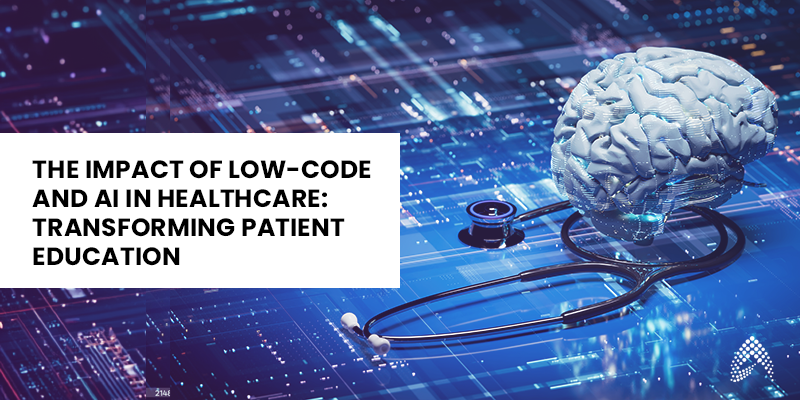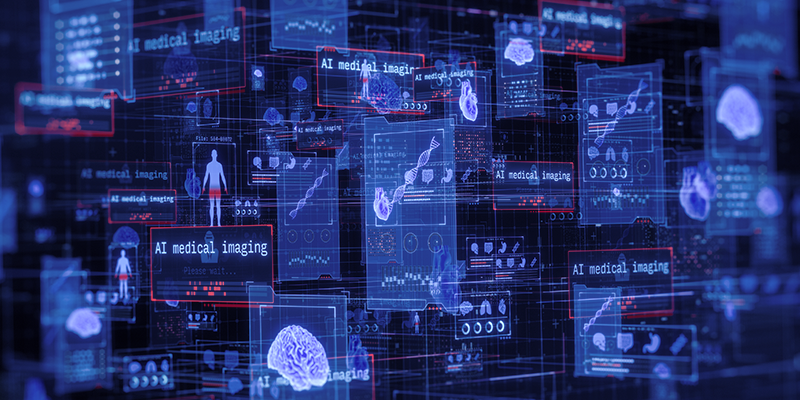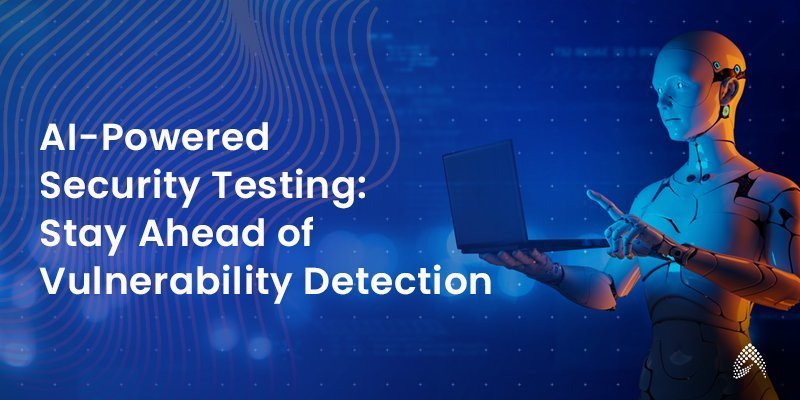The Impact of Low-Code and AI in Healthcare: Transforming Patient Education

In today’s rapidly advancing healthcare landscape, effective patient education stands as a cornerstone for improving health outcomes and empowering individuals to manage their well-being proactively. Despite this importance, a significant number of patients—ranging from 50% to 70%—leave medical consultations without fully comprehending their health conditions. This lack of understanding contributes to poorer health outcomes, increased healthcare costs, and diminished patient satisfaction.
Traditional methods of patient education face challenges such as time constraints, lack of personalization, limited patient engagement, and the widespread impact of misinformation on the internet. To address these issues, healthcare providers are increasingly adopting innovative solutions that enhance patient education. One such solution is the development of scalable and personalized educational apps, which can provide engaging content tailored to individual patient needs.
Technologies like low-code development and artificial intelligence (AI) play a crucial role in creating these apps. Low-code platforms enable rapid development and deployment of educational tools, allowing healthcare providers to quickly respond to changing patient needs and feedback. AI can further personalize the educational experience by analyzing patient data to deliver relevant information and recommendations. Together, these technologies offer a comprehensive approach to improving patient education, ensuring patients are better informed and empowered to manage their health.
This blog explores the transformative potential of low-code and AI in patient education, highlighting their benefits and practical applications in improving healthcare delivery.
The Patient Education Challenge
Effective patient education is paramount to improving health outcomes and empowering patients to manage their conditions proactively. However, traditional methods often fall short due to several key challenges:
- Time Constraints: Healthcare providers face increasing patient volumes and limited consultation time, hindering their ability to deliver comprehensive patient education. With typical appointment times averaging 10–15 minutes, the depth of information shared may be insufficient for patients to fully grasp their health situations.
- Lack of Personalization: Generic educational materials fail to address the diverse needs and learning styles of individual patients, leading to confusion and suboptimal understanding.
- Limited Engagement: Static materials struggle to capture patient attention and promote active learning, resulting in poor information retention.
- Misinformation: The internet, while a vast source of information, is also rife with misinformation. Patients may struggle to distinguish credible sources from unreliable ones, potentially exacerbating confusion and anxiety about their health conditions.
To address these challenges and enhance patient education, healthcare organizations must adopt innovative approaches.
How New-Age Technology Can Improve Patient Education
The issues discussed above—limited consultation time, lack of personalization, and the spread of misinformation—pose significant barriers to effective patient education. To address these challenges and enhance the learning process, new-age technologies offer innovative solutions that improve both the delivery and impact of educational content.
Low-code platforms are at the forefront of this transformation. They allow healthcare providers to develop educational apps quickly and efficiently, using pre-built components and user-friendly interfaces. This rapid development capability enables the swift creation of educational resources tailored to patient needs. By incorporating interactive elements like quizzes and simulations, low-code platforms make learning more engaging and accessible, helping patients absorb and retain critical health information.
Additionally, Artificial Intelligence (AI) personalizes content by analyzing individual patient data and preferences, delivering tailored information and real-time support through AI-driven chatbots. Together, low-code and AI technologies tackle the key challenges of traditional patient education, making learning more effective and accessible.
Innovating Patient Education with Low-Code Development and AI
Overcoming Time Constraints
Low-code platforms enable healthcare providers to create educational resources rapidly by using pre-built templates and drag-and-drop interfaces. This approach minimizes the need for extensive coding and allows for quick development and updates of content. By reducing the time required for creating and maintaining educational materials, these platforms free up valuable consultation time. Consequently, patients benefit from 24/7 access to up-to-date educational resources, enabling them to learn and review information at their convenience, independent of their scheduled appointments.
Addressing Personalization Needs
Low-code apps offer features to tailor content based on individual patient profiles, preferences, and health literacy levels. AI-powered algorithms can further refine personalization by delivering content that aligns with specific patient needs and learning styles.
Enhancing Engagement
Interactive elements, such as quizzes, simulations, and gamification, can be easily integrated into low-code applications to capture patient interest and improve information retention. AI can enhance engagement by providing personalized recommendations and adaptive learning experiences.
Combating Misinformation
Low-code platforms and AI can help filter out inaccurate information and provide patients with reliable, trustworthy resources. AI-powered chatbots can address patient concerns and misconceptions, offering accurate and up-to-date information.
By leveraging low-code and AI, healthcare organizations can create patient education solutions that are:
- Efficient: Streamlined development and delivery of educational materials.
- Personalized: Tailored content to meet individual patient needs.
- Engaging: Interactive experiences that capture patient interest.
- Accurate: Reliable information and resources to combat misinformation.
Transforming Patient Education through Low-Code
Addressing the gap in patient comprehension is crucial for Healthcare IT decision-makers, professionals, and consultants. Low-code app development emerges as a powerful solution, empowering healthcare providers to create engaging and personalized educational tools that can be easily integrated into existing systems. These innovative tools address the limitations of traditional and modern methods by offering features like 24/7 accessibility, personalized learning experiences tailored to individual needs, and interactive elements. This combination not only improves information retention but also fosters a deeper understanding and engagement among patients.
The exciting potential of AI further enhances this approach. For instance, AI-powered chatbots provide personalized support, adaptive learning modules adjust difficulty based on progress, and interactive simulations help patients practice healthcare skills. Combining these advancements with low-code development transforms patient education, empowering individuals to actively manage their health and achieve optimal outcomes.
By leveraging these advanced tools, healthcare providers can foster a more informed and engaged patient population, leading to enhanced healthcare outcomes overall.
The Next Steps
Throughout this article, we’ve explored how low-code and AI can enhance patient education. Amzur, a leading provider of low-code solutions with extensive experience in the healthcare industry, can help you implement these innovations in your practice. With a proven track record of delivering successful low-code projects, Amzur is well-equipped to guide you through every step of the development process.
Our expertise in low-code development ensures that healthcare providers can create efficient, personalized, and engaging educational tools that significantly improve patient outcomes. Additionally, for further insights into how these technologies are bringing about change and transformation across industries, you can download our AI-driven low-code automation whitepaper.

Technical Architect




